|
Listed by department/campus. See
other faculty achievements in
Top
Stories.
BIOMEDICAL SCIENCES
The lab group of Professor Michael
Blaber, Ph.D., has had numerous recent publications. “Kallikrein 6
Regulates Early CNS Demyelination in a Viral Model of Multiple Sclerosis”
was published in Brain Pathology. Authors included Hyesook
Yoon (postdoctoral fellow), Sachiko Blaber (lab
manager) and Michael Blaber. “Substrate recognition mechanism of a
glycosyltrehalose trehalohydrolase (GTHase) from sulfolobus solfataricus
KM1” was published by Protein Science, with Blaber listed as an
author. Also in Protein Science was “A structural mechanism for
dimeric to tetrameric oligomer conversion in halomonas sp. Nucleoside
diphosphate kinase.” Blaber collaborated as an author.
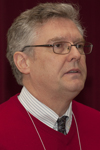 Blaber
also collaborated as an author on “Kallikrein 6 is a Novel Molecular Trigger
of Reactive Astrogliosis” in Biological Chemistry and on “An
empirical phase diagram approach to investigate conformational stability of
‘second-generation’ functional mutants of acidic fibroblast growth factor
(FGF-1)” in Protein Science. Blaber
also collaborated as an author on “Kallikrein 6 is a Novel Molecular Trigger
of Reactive Astrogliosis” in Biological Chemistry and on “An
empirical phase diagram approach to investigate conformational stability of
‘second-generation’ functional mutants of acidic fibroblast growth factor
(FGF-1)” in Protein Science.
The Blaber
lab recently had one issued patent and one new funding award. U.S. Patent
8,119,766 was assigned to “Mutants of Human Fibroblast Growth Factor Having
Increased Stability and/or Mitogenic Potency (divisional).” The application
was filed by Blaber and Vikash Dubey, a former postdoc in
the lab. And Blaber was a principal investigator on a State University
Research Foundation Application Proof of Concept (GAP) Grant awarded for
2012; the co-P.I. is Joseph Schlenoff from the Department of Chemistry &
Biochemistry. The grant is titled “Novel Biocompatible Polymer Material
Using Engineered Human Fibroblast Growth Factor-1 for Accelerated Wound
Healing.”
The lab of Associate Professor Mohamed Kabbaj,
Ph.D., had several papers published recently. “Extracellular
Signal-Regulated Kinase 2 Signaling in the Hippocampal Dentate Gyrus
Mediates the Antidepressant Effects of Testosterone,” co-authored with
graduate student Nicole Carrier, appeared in Biological
Psychiatry. “Juvenile and adult rats differ in cocaine reward and
expression of zif268 in the forebrain,” co-authored with Carrier,
David Dietz, F. Hollis and
M. Gaval-Cruz, appeared in Neuroscience (200). And
“Testosterone and imipramine have antidepressant effects in socially
isolated male but not female rats,” co-authored with Carrier, was published
in the journal Hormones and Behaviors.
Kabbaj
also participated in two events in Washington, D.C.: February’s NIMH
Research Domain Criteria Project (RDoC) workshop, to discuss and develop new
ways of classifying mental disorders based on dimensions of observable
behavior and neurobiological measures; and March’s F02a Behavioral
Neuroscience Fellowship study section.
Professor James Olcese,
Ph.D., was awarded a Planning Grant by the Florida State University Council
on Research & Creativity. Here is an excerpt from the comments of one grant
reviewer: “Recent studies have established the correlation between traumatic
brain injury early in life and high risk of Alzheimer’s disease. A recent
exciting observation from this lab is the neuroprotective effect of
melatonin. This proposal is to test an attractive hypothesis that melatonin
slows or prevents the development of neuropathology and cognitive deficits
in two mouse models of Alzheimer’s disease…. The positive results will
promote the development of melatonin as a therapeutic following traumatic
brain injury.”

A paper from the lab of Associate Professor Yanchang Wang,
Ph.D. (pictured here), has been published in PLoS Genetics. The
paper was “Loss of function of the Cik1/Kar3 motor complex results in
chromosomes with syntelic attachment that are sensed by the tension
checkpoint.” The main author was Fengzhi Jin, Ph.D.,
assistant in medicine in the Wang lab. Among the co-authors was Hong
Liu, former graduate student in the lab. Wang was the major
corresponding author.
CLINICAL SCIENCES
Jonathan Appelbaum, M.D. (on the left in
this photo), received an award from the American Academy of HIV Medicine for
his “creative, tenacious and inspired leadership” as co-principal
investigator of
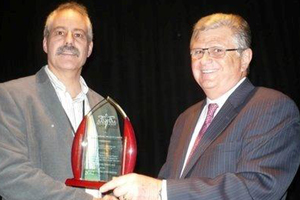 The
HIV and Aging Consensus Project: Recommended Treatment Strategies for
Clinicians Managing Older Patients with HIV. The award was presented in
March at the organization’s Seattle meeting, held in conjunction with the
19th Conference on Retroviruses and Opportunistic Infections (CROI). When
the report was issued late last year, the press release quoted Appelbaum:
“This will be a valuable reference resource, an informed guide for the
physician who has HIV patients manifesting multiple age-related diseases and
is not sure how best to approach such challenges.” The
HIV and Aging Consensus Project: Recommended Treatment Strategies for
Clinicians Managing Older Patients with HIV. The award was presented in
March at the organization’s Seattle meeting, held in conjunction with the
19th Conference on Retroviruses and Opportunistic Infections (CROI). When
the report was issued late last year, the press release quoted Appelbaum:
“This will be a valuable reference resource, an informed guide for the
physician who has HIV patients manifesting multiple age-related diseases and
is not sure how best to approach such challenges.”
Appelbaum
also was interviewed for the article “5 lies we tell our doctors” in
Tallahassee Your Health Monthly.
Professor Gerry
Maitland, M.D., was elected to a Council of Aging Hall of Fame
for 2011-2012.
Get the details.
(Professor Alice Pomidor also was elected. See the Geriatrics news below.)
Maitland also presented as the senior
author with students for each of the following: “Functional Ambulatory
Profile and Gait Changes During Increased Cognitive Load in Parkinson
Disease,” with co-authors L.L. LaPointe and J.A.G. Stierwalt, XIX World
Congress on Parkinson’s Disease and Related Disorders, in Shanghai, China,
in December; “Low Contrast Sensitivity and Gait Analysis in Idiopathic
Parkinson’s Disease,” with co-authors C. Swigler and L.L.
LaPointe, same event as above; and “Contrast sensitivity visual acuity is
deficient in Parkinson’s disease and degrades multiple aspects of motor
performance under conditions of dim illumination,” which was accepted by the
North American NeuroOphthalmology Society, in San Antonio in February.
Professor Ed Valenstein, M.D., is the co-author of
“Clinical Neuropsychology,” which reviews the major neurobehavioral
disorders associated with brain dysfunction and injury. Like previous
editions of the textbook, this Fifth Edition focuses on the clinical
presentation of the major neurobehavioral syndromes, including symptoms,
signs, methods of assessment that are useful for diagnosis, and also their
underlying anatomy, physiology and pathology.
Assistant Director Rhonda Collins was selected to
receive a Florida State University Exemplary Employee Award in
Administration. She and other recipients across campus were honored in April
at the Division of Academic Affairs Employee Recognition Awards Ceremony.
FAMILY
MEDICINE AND RURAL HEALTH
 The
department’s newest faculty member is Joedrecka “Jo” Brown,
M.D. The Florida native grew up in Tallahassee and moved back here from
Tampa, where she was active in the community. Before going into private
practice, she was on the faculty with the USF-Morton Plant Mease Family
Medicine Residency Program. She has special interests in preventive care,
women’s health, underserved medicine and global health. In addition, she is
interested in physician/student leadership development, patient empowerment
and health disparities. She already participated in the College of
Medicine’s spring medical-outreach trip to Nicaragua. The
department’s newest faculty member is Joedrecka “Jo” Brown,
M.D. The Florida native grew up in Tallahassee and moved back here from
Tampa, where she was active in the community. Before going into private
practice, she was on the faculty with the USF-Morton Plant Mease Family
Medicine Residency Program. She has special interests in preventive care,
women’s health, underserved medicine and global health. In addition, she is
interested in physician/student leadership development, patient empowerment
and health disparities. She already participated in the College of
Medicine’s spring medical-outreach trip to Nicaragua.
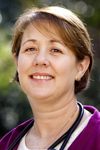 Associate
Professor Suzanne Harrison, M.D., presented “Clerkship
Projects as Supplemental Educational Tools” in Long Beach, Calif., at the
38th Annual Conference on Medical Student Education, sponsored by the
Society for Teachers of Family Medicine. She and her fellow researchers
(Associate Chair Curt Stine, M.D., Administrative
Specialist Amy Griffin and clerkship faculty member
Amanda McBane) conducted a national survey of family medicine
education directors regarding projects included in the curriculum of family
medicine and primary care clerkships. The results that were discussed
included application to ACGME competencies. Associate
Professor Suzanne Harrison, M.D., presented “Clerkship
Projects as Supplemental Educational Tools” in Long Beach, Calif., at the
38th Annual Conference on Medical Student Education, sponsored by the
Society for Teachers of Family Medicine. She and her fellow researchers
(Associate Chair Curt Stine, M.D., Administrative
Specialist Amy Griffin and clerkship faculty member
Amanda McBane) conducted a national survey of family medicine
education directors regarding projects included in the curriculum of family
medicine and primary care clerkships. The results that were discussed
included application to ACGME competencies.
GERIATRICS
Read about Dr. Niharika Suchak’s national honor.
Department Chair Ken Brummel-Smith, M.D., was featured in
the March newsletter of SCAN Health Plan discussing how to improve
communication about end-of-life care. Excerpt: “The main barrier in
communication with older persons (and their families) is not taking the time
early in the relationship to get a clear picture of the patient’s goals and
wishes. We physicians assume that every patient wants everything. Sure,
that’s true sometimes, but especially in the very old (above 75 or 80), they
have lost a big push to ‘fix’ things and just want to function as
independently as possible. If we take the time to see what they really
value, it turns out they may not want to do a lot of the things we take for
granted.”
Brummel-Smith also was selected in a
student-body vote to be the College of Medicine’s nominee for the 2012 AAMC
Humanism in Medicine Award. The criteria are positive mentoring skills,
involvement in community service, compassion/sensitivity, collaboration with
students and patients, and modeling ethics of the profession.
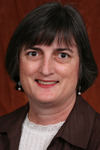 Professor
Lisa Granville, M.D., served as geriatrics section leader
for the Scientific Program Subcommittee responsible for planning the
education program of the American College of Physicians’ annual meeting in
April. She also presented two sessions: “Competency Certification in Gait
and Fall Risk Evaluation for Health Care Practitioners” and “Women’s Sexual
Health and Aging.” At the Society of Teachers of Family Medicine annual
meeting later in the month, she (along with Clerkship Director John
Agens, M.D., and Program Director Suzanne Baker,
M.A.) presented “Geriatrics Immersion Training for FM Residents: Evolution
and Lessons Learned Across 4 Years.” Professor
Lisa Granville, M.D., served as geriatrics section leader
for the Scientific Program Subcommittee responsible for planning the
education program of the American College of Physicians’ annual meeting in
April. She also presented two sessions: “Competency Certification in Gait
and Fall Risk Evaluation for Health Care Practitioners” and “Women’s Sexual
Health and Aging.” At the Society of Teachers of Family Medicine annual
meeting later in the month, she (along with Clerkship Director John
Agens, M.D., and Program Director Suzanne Baker,
M.A.) presented “Geriatrics Immersion Training for FM Residents: Evolution
and Lessons Learned Across 4 Years.”
Granville also
presented a three-hour workshop in DeFuniak Springs on Alzheimer’s disease
for Alzheimer’s Family Services.
Professor
Alice Pomidor, M.D., was elected to a Council of Aging Hall of Fame
for 2011-2012.
Get the details.
Associate Professor Niharika
Suchak, M.D., was the U.S.A. coordinator and an invited speaker in
February at the Second International Conference on Gerontology and Geriatric
Medicine in New Delhi. She moderated a protocol development workshop on COPD
management and participated in a plenary session on palliative care, a forum
on careers in geriatric medicine and gerontology, and workshops on
end-of-life-care guidelines in India and on expanding educators’ repertoire
of teaching strategies. Also during that trip, she was invited to provide a
geriatrics update for the Scientific Programme of the Indian Medical
Association, Mumbai West Branch.
ELSEWHERE ON THE MAIN
CAMPUS
Associate Dean for Faculty Development Dennis
Baker, Ph.D., was co-author of these publications: “Medicine, Law,
Ethics: Teaching Versus Learning,” Clinical Teacher (in press),
with Marshall Kapp (see below) and Assistant Dean for
Faculty Development Greg Turner, Ed.D.; “What Do Medical
Students Think About the Law? Report of a Focus Group,” Legal Medicine
Perspectives, also with Kapp and Turner; and “Teacher-Student
Relationships in Medical Education: Boundary Considerations,” Medical
Teacher, with S.M. Plaut.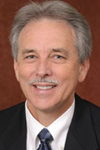
Baker also made these recent presentations at
conferences: “Description of a Robust Faculty Development Program for
Community-Based Faculty at Six Regional Campuses,” in Seattle at the Annual
Conference of the Society of Teachers of Family Medicine, with Director of
Medical Informatics Education Nancy Clark, M.Ed., and
Turner; and “Conducting Successful Faculty Development
Workshop for Community-Based Clerkship Faculty,” in Nashville at the Annual
Meeting of the AAMC Group on Regional Medical Campuses.
Associate
Dean for Health Affairs Les Beitsch, M.D., J.D., received
the student-sponsored Guardian of the Flame award. He was one of 15 faculty
members across campus to be honored this year for their commitment to
advancing Florida State as a leading institution of higher education.
OB-GYN Education Director Arthur Clements, M.D., Ph.D.,
presented a paper at a Medical Group Management Association meeting in
Chicago on “Electronic Medical Records and the Use of Portals in a
12-Physician Private Ob-Gyn Practice: Cost, Benefits, Pitfalls, Pre- and
Post- Implementation Findings, and Patient Responses.”
Marshall B. Kapp, J.D., M.P.H., director of the Center for
Innovative Collaboration in Medicine and Law, had several new publications.
One was a book review of “The Law of Life and Death,” by Elizabeth Price
Foley, in Care Management Journals (2012). Another was a book
review essay titled “Medical Problems, Legal Responses,” a review of
“Poverty, Health and Law: Readings and Cases for Medical-Legal Partnership,”
by Elizabeth Tobin Tyler, Ellen Lawton, Kathleen Conroy, Megan Sandel and
Barry Zuckerman, in Journal of Law, Medicine and Ethics (Spring
2012). He also published a book-review essay in The Gerontologist
titled “Legal and Ethical Approaches to Older Lives: Reconciling Rules and
Relationships.” And with Dennis Baker and Greg
Turner (see above), he authored “Teaching Medical Students How to
Reconcile Law and Ethics in Practice: A Faculty Development Model,”
Annals of Health Law (Special Edition 2012).
Kapp
also presented “Medical-Legal Literature 2011-12: Patient Protection and
Affordable Care Act” at the annual meeting of the American College of Legal
Medicine in New Orleans.
ACROSS SEVERAL CAMPUSES
Chris Clark (Pensacola campus),
Claudin Pierre-Louis (Orlando), Matt Johnson
(formerly at Pensacola), Dana Johnson (Pensacola) and
Assistant Dean
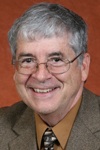 for
Information Management John Van Wingen (pictured here) each
received a certificate of commendation in the 2012 Prudential-Davis
Productivity Awards competition as members of the Faculty Data Management
System development team. The work was done by personnel from the regional
campuses and focused on the campus’s administrative and reporting needs when
working with their clerkship faculty. Because all information is maintained
in a central database and the application is now used by all campuses,
everyone benefits from added features and functionality. “I use the system
daily,” said Orlando Regional Campus Administrator Leeann
Parker, who nominated the team, “and have been delighted
with the way it streamlines our management of faculty info at the regional
campuses.” for
Information Management John Van Wingen (pictured here) each
received a certificate of commendation in the 2012 Prudential-Davis
Productivity Awards competition as members of the Faculty Data Management
System development team. The work was done by personnel from the regional
campuses and focused on the campus’s administrative and reporting needs when
working with their clerkship faculty. Because all information is maintained
in a central database and the application is now used by all campuses,
everyone benefits from added features and functionality. “I use the system
daily,” said Orlando Regional Campus Administrator Leeann
Parker, who nominated the team, “and have been delighted
with the way it streamlines our management of faculty info at the regional
campuses.”
CLERKSHIP FACULTY MEMBERS
AT REGIONAL CAMPUSES:
FORT PIERCE
Richard Weisberg, D.O., has been
elected chairman of family practice for Martin Health System for 2012-2013.
Michael Wein, M.D., was co-author of a paper in the
February edition of The Journal of Allergy and Clinical Immunology.
It was titled “Outdated Epinephrine Autoinjectors: Ejection Volume Integrity
and Epinephrine Content and Dose.”
Wein also was
co-leader of an immunotherapy seminar at the 2012 American Academy of
Allergy Asthma & Immunology annual meeting.
The National Committee
for Quality Assurance (NCQA) has awarded the medical practice of
Bernd Wollschlaeger, M.D., Level 2 medical home designation for
delivering accessible, comprehensive and family-centered primary care that
aims to reduce avoidable health-care costs over time. “The hallmarks of a
medical home,” he said, “are an ongoing relationship with a primary care
doctor; a physician-led team-based approach with a group of individuals who
collectively take care of the patient’s ongoing needs across all health-care
settings; a focus on care coordination that is culturally and linguistically
appropriate; the use of electronic medical records to ensure that care is
delivered safely and prevents redundancy and errors; and the ability to
offer access during evenings and weekends.”
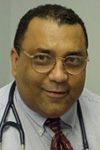
ORLANDO
Santiago Martinez, M.D., spoke
at the Second French Egyptian Congress of Allergy and Immunology in Paris.
The April convention included presentations from renowned French and
Egyptian professors. Martinez presented on “Eosinophilic Esophagitis and
Food Allergies Diagnosis and Treatment.” He has been an Orlando Regional
Campus faculty member since 2003.
PENSACOLA
R. Scott Benson, M.D., has served this year as
speaker-elect of the Assembly of the American Psychiatric Association. He
will be elevated to speaker at the APA’s Annual Meeting in Philadelphia on
May 7.
Jeff Buchalter, M.D., was
co-author of a recently published textbook, “Diagnosis, Management and
Treatment of Discogenic Pain.” It’s one of the first dedicated to the
diagnosis and treatment of spine-related discogenic pain, a leading cause of
chronic intractable back pain.
Tim Mott, M.D., was
named to the Board of Directors of the
Family Physicians Inquiries Network,
a consortium that has developed over the past 10 years in response to a need
to make evidence-based family medicine and clinical scholarship more
accessible to family physicians in clinical practice.
Read about George Smith’s becoming president of the
Florida Academy of Family Physicians and president of the Escambia County
Medical Society.
SARASOTA
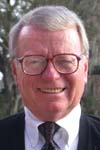 Surgery
Clerkship Director Ed Bradley, M.D. (pictured here),
recently was selected as one of America’s Top Surgeons for 2012 by the
Consumers’ Research Council of America. Surgery
Clerkship Director Ed Bradley, M.D. (pictured here),
recently was selected as one of America’s Top Surgeons for 2012 by the
Consumers’ Research Council of America.
Adam Bright,
M.D., Sarasota Memorial Hospital’s chief of surgery and president of the
Florida Orthopedic Society, will present his paper, “Comparison of the
coronal and axial and sagittal views on MRI to detect ACL insufficiency,” at
the society’s 2012 annual meeting. As a special project at that meeting,
he’s encouraging participants to help build a $250,000
handicapped-accessible playground to fight obesity.
Bruce
Fleegler, M.D., was co-author of “Descriptive Characteristics of
Severity of Illness of ICU Patients Discharged to and Subsequently
Readmitted from Long-Term Acute Care,” which can be found in the supplement
to the December issue of Critical Care Medicine. A poster
presentation was accepted at the Society of Critical Care Medicine meeting
in Houston in February.
Steven Halbreich, M.D., was
named Physician of the Year for 2012 at Doctors Hospital of Sarasota.
John Moor, M.D., was selected to be a
manuscript reviewer for the Journal of Shoulder and Elbow Surgery.
Russell Samson, M.D., was an invited speaker at the
Society for Clinical Vascular Surgery meeting in Las Vegas. He presented
four lectures on topics related to vascular surgery and vascular medicine.
The following week he was an invited speaker at the Houston Aortic Summit,
where he presented his research on medical therapies to reduce aortic
aneurysm growth.
|




 Blaber
also collaborated as an author on “Kallikrein 6 is a Novel Molecular Trigger
of Reactive Astrogliosis” in Biological Chemistry and on “An
empirical phase diagram approach to investigate conformational stability of
‘second-generation’ functional mutants of acidic fibroblast growth factor
(FGF-1)” in Protein Science.
Blaber
also collaborated as an author on “Kallikrein 6 is a Novel Molecular Trigger
of Reactive Astrogliosis” in Biological Chemistry and on “An
empirical phase diagram approach to investigate conformational stability of
‘second-generation’ functional mutants of acidic fibroblast growth factor
(FGF-1)” in Protein Science.  The
HIV and Aging Consensus Project: Recommended Treatment Strategies for
Clinicians Managing Older Patients with HIV. The award was presented in
March at the organization’s Seattle meeting, held in conjunction with the
19th Conference on Retroviruses and Opportunistic Infections (CROI). When
the report was issued late last year, the press release quoted Appelbaum:
“This will be a valuable reference resource, an informed guide for the
physician who has HIV patients manifesting multiple age-related diseases and
is not sure how best to approach such challenges.”
The
HIV and Aging Consensus Project: Recommended Treatment Strategies for
Clinicians Managing Older Patients with HIV. The award was presented in
March at the organization’s Seattle meeting, held in conjunction with the
19th Conference on Retroviruses and Opportunistic Infections (CROI). When
the report was issued late last year, the press release quoted Appelbaum:
“This will be a valuable reference resource, an informed guide for the
physician who has HIV patients manifesting multiple age-related diseases and
is not sure how best to approach such challenges.”  The
department’s newest faculty member is Joedrecka “Jo” Brown,
M.D. The Florida native grew up in Tallahassee and moved back here from
Tampa, where she was active in the community. Before going into private
practice, she was on the faculty with the USF-Morton Plant Mease Family
Medicine Residency Program. She has special interests in preventive care,
women’s health, underserved medicine and global health. In addition, she is
interested in physician/student leadership development, patient empowerment
and health disparities. She already participated in the College of
Medicine’s spring medical-outreach trip to Nicaragua.
The
department’s newest faculty member is Joedrecka “Jo” Brown,
M.D. The Florida native grew up in Tallahassee and moved back here from
Tampa, where she was active in the community. Before going into private
practice, she was on the faculty with the USF-Morton Plant Mease Family
Medicine Residency Program. She has special interests in preventive care,
women’s health, underserved medicine and global health. In addition, she is
interested in physician/student leadership development, patient empowerment
and health disparities. She already participated in the College of
Medicine’s spring medical-outreach trip to Nicaragua. Professor
Lisa Granville, M.D., served as geriatrics section leader
for the Scientific Program Subcommittee responsible for planning the
education program of the American College of Physicians’ annual meeting in
April. She also presented two sessions: “Competency Certification in Gait
and Fall Risk Evaluation for Health Care Practitioners” and “Women’s Sexual
Health and Aging.” At the Society of Teachers of Family Medicine annual
meeting later in the month, she (along with Clerkship Director John
Agens, M.D., and Program Director Suzanne Baker,
M.A.) presented “Geriatrics Immersion Training for FM Residents: Evolution
and Lessons Learned Across 4 Years.”
Professor
Lisa Granville, M.D., served as geriatrics section leader
for the Scientific Program Subcommittee responsible for planning the
education program of the American College of Physicians’ annual meeting in
April. She also presented two sessions: “Competency Certification in Gait
and Fall Risk Evaluation for Health Care Practitioners” and “Women’s Sexual
Health and Aging.” At the Society of Teachers of Family Medicine annual
meeting later in the month, she (along with Clerkship Director John
Agens, M.D., and Program Director Suzanne Baker,
M.A.) presented “Geriatrics Immersion Training for FM Residents: Evolution
and Lessons Learned Across 4 Years.”
 for
Information Management John Van Wingen (pictured here) each
received a certificate of commendation in the 2012 Prudential-Davis
Productivity Awards competition as members of the Faculty Data Management
System development team. The work was done by personnel from the regional
campuses and focused on the campus’s administrative and reporting needs when
working with their clerkship faculty. Because all information is maintained
in a central database and the application is now used by all campuses,
everyone benefits from added features and functionality. “I use the system
daily,” said Orlando Regional Campus Administrator Leeann
Parker, who nominated the team, “and have been delighted
with the way it streamlines our management of faculty info at the regional
campuses.”
for
Information Management John Van Wingen (pictured here) each
received a certificate of commendation in the 2012 Prudential-Davis
Productivity Awards competition as members of the Faculty Data Management
System development team. The work was done by personnel from the regional
campuses and focused on the campus’s administrative and reporting needs when
working with their clerkship faculty. Because all information is maintained
in a central database and the application is now used by all campuses,
everyone benefits from added features and functionality. “I use the system
daily,” said Orlando Regional Campus Administrator Leeann
Parker, who nominated the team, “and have been delighted
with the way it streamlines our management of faculty info at the regional
campuses.”
 Surgery
Clerkship Director Ed Bradley, M.D. (pictured here),
recently was selected as one of America’s Top Surgeons for 2012 by the
Consumers’ Research Council of America.
Surgery
Clerkship Director Ed Bradley, M.D. (pictured here),
recently was selected as one of America’s Top Surgeons for 2012 by the
Consumers’ Research Council of America.